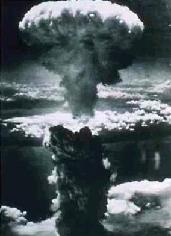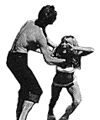The Real Reason Truman Dropped the A-Bomb on Japan?
Friday, July 22, 2005 → by Danieru History is written by the winners. It has and probably always will be that way. Allied attrocities in World War II most definitely happened, but they are seldom mentioned amongst the lists and lists of activities we can find for the enemy (Germany, Japan etc.). The dropping of the A-bomb was an attrocious act, and America has never been questioned over that action because from an allied historical perspective it was a 'necessary' event. I don't dispute the horrors that World War II provided, I just think that dropping the A-Bomb was one of the worst.
History is written by the winners. It has and probably always will be that way. Allied attrocities in World War II most definitely happened, but they are seldom mentioned amongst the lists and lists of activities we can find for the enemy (Germany, Japan etc.). The dropping of the A-bomb was an attrocious act, and America has never been questioned over that action because from an allied historical perspective it was a 'necessary' event. I don't dispute the horrors that World War II provided, I just think that dropping the A-Bomb was one of the worst.60 years in the making, new evidence might throw the commonly held historical slant out the window:
"The US decision to drop atomic bombs on Hiroshima and Nagasaki in 1945 was meant to kick-start the Cold War rather than end the Second World War, according to two nuclear historians who say they have new evidence backing the controversial theory..."I AM become death, the shatterer of worlds." - From the Hindu scripture, Bhagavad Gita.
...According to an account by Walter Brown, assistant to then-US secretary of state James Byrnes, Truman agreed at a meeting three days before the bomb was dropped on Hiroshima that Japan was "looking for peace". Truman was told by his army generals, Douglas Macarthur and Dwight Eisenhower, and his naval chief of staff, William Leahy, that there was no military need to use the bomb.
"Impressing Russia was more important than ending the war in Japan," says Selden. Truman was also worried that he would be accused of wasting money on the Manhattan Project to build the first nuclear bombs, if the bomb was not used, he adds..." - link
Categories: Japan, USA, A-Bomb, Nuclear, WWII, History, News, Politics
|
|

 Links
Links Subscribe via RSS!
Subscribe via RSS!


 Via Email
Via Email


I think you have a real great site. I always search for this kind of information online and i am glad to have cross your site. I look forward to all the updates. I have found a great web site, go to
http://ibcnews.blogspot.com
Thanks again.
July 24, 2005 7:40 AM
July 25, 2005 1:08 PM
July 25, 2005 7:46 PM
...but not unconditional surrender.
July 27, 2005 2:07 AM
June 27, 2007 6:34 PM
But according to various records and accounts (all easily verifiable through internet research - and I don't mean "blogs" - no offense) Japan was willing to accept these "unconditional" conditions as early as May, 1945. The U.S. (Truman and Bynes to be exact) chose to ignore and drop the bomb(s) more as a 'warning' to the burgeoning Communist threat that "we're the big kids on the block now and have the biggest guns so don't mess with us...or else."
Affording no mea culpas to the Japanese war machine and the atrocities committed by them or to in any way disgrace or disparage the loss of our American service persons' lives, IMO, dropping the Hiroshima bomb (and certainly the Nagasaki bomb) was an unnecessary, cruel show of bully strength - not against the Japanese military - but to impress and 'frighten' the Russians at the expense of hundreds of thousands of innocent civilian women and children.
I don't agree, however, that "history is written by the winners". The history that is remembered is written by the winners and it's up to venues such as this to re-write that 'memorable' history. Perhaps even more aptly: Just who are the winners anyway? Are there winners? And what exactly does 'winning' mean?
August 22, 2007 10:07 PM
December 11, 2008 5:26 AM
December 18, 2008 5:07 PM
Post a Comment